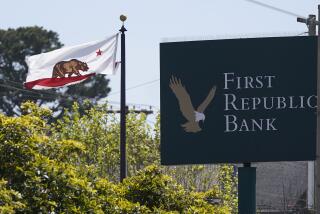Getting financial reform right
- Share via
Now that we’ve all had the pleasure of paying for Wall Street’s last collapse, who should be on the hook for the next one? That question underlies the long-running rhetorical battle over the regulatory overhaul proposal that Democrats steered through a conference committee this week. Republicans have warned that the bill, HR 4173, would guarantee that Wall Street firms would be bailed out by the government in the future. Democrats insisted that the bill would do just the opposite, confining the losses at failed companies to their investors and employees.
Both sides exaggerate — no surprise there. The bill is better than its critics claim, even if it addresses the last problem (a housing bubble fueled by reckless mortgage lending) more than whatever the next one might be. But the clash between the parties will leave taxpayers more exposed than they should be to the cost of girding against the next colossal failure.
Although no law is going to stop Washington from taking extraordinary steps when needed to keep the credit markets working, the Democrats’ proposal would at least reduce the likelihood of another round of bailouts. Among other things, it would create new safeguards against big financial companies bringing down the entire system, make it easier for investors and regulators to judge risks, and increase the amount of reserves held by companies that trade derivatives. It also would empower the Federal Deposit Insurance Corp. to take over failing financial companies and conduct expedited bankruptcy-like processes to salvage assets and parcel out losses to investors and creditors.
These steps would make the system less prone to the cascade of failures that threatened Wall Street two years ago. The Congressional Budget Office, however, calculated that the bill would cost nearly $20 billion over the next decade. The House had initially proposed to charge financial companies a fee to pay for future rescues, but the Senate rejected this idea after critics argued that it would institutionalize bailouts. Negotiators for the two chambers then proposed to cover the bill’s costs by imposing a tax on big banks, hedge funds and private equity firms, with higher rates paid by companies engaged in riskier activities. When the four Senate Republicans who had supported the bill balked at the tax, however, conferees abandoned it, relying instead on some budgetary legerdemain and increased deposit-insurance premiums from big banks.
The higher premiums will be felt by the banks that insure about 80% of the country’s deposits, along with their customers. But those are the wrong targets — insured deposits didn’t cause the last Wall Street crisis. A tax on investment firms based on their risk-taking was the right way to fund this bill, and it’s a shame that lawmakers couldn’t find 60 votes in the Senate for it.
More to Read
Get the L.A. Times Politics newsletter
Deeply reported insights into legislation, politics and policy from Sacramento, Washington and beyond. In your inbox twice per week.
You may occasionally receive promotional content from the Los Angeles Times.










